(完整版)一般将来时的被动语态
- 格式:ppt
- 大小:2.58 MB
- 文档页数:37
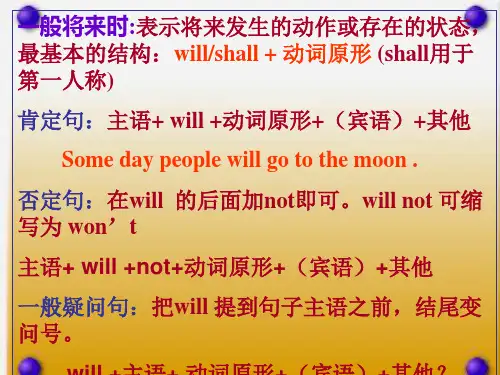
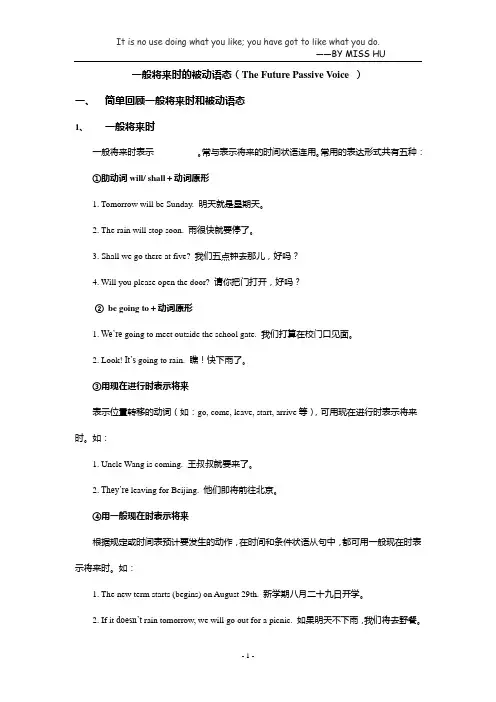
一般将来时的被动语态(The Future Passive Voice )一、简单回顾一般将来时和被动语态1、一般将来时一般将来时表示__________。
常与表示将来的时间状语连用。
常用的表达形式共有五种:①助动词will/ shall+动词原形1. Tomorrow will be Sunday. 明天就是星期天。
2. The rain will stop soon. 雨很快就要停了。
3. Shall we go there at five? 我们五点钟去那儿,好吗?4. Will you please open the door? 请你把门打开,好吗?②be going to+动词原形1. We’re going to meet outside the school gate. 我们打算在校门口见面。
2. Look! It’s going to rain. 瞧!快下雨了。
③用现在进行时表示将来表示位置转移的动词(如:go, come, leave, start, arrive等),可用现在进行时表示将来时。
如:1. Uncle Wang is coming. 王叔叔就要来了。
2. They’re leaving for Beijing. 他们即将前往北京。
④用一般现在时表示将来根据规定或时间表预计要发生的动作,在时间和条件状语从句中,都可用一般现在时表示将来时。
如:1. The new term starts (begins) on August 29th. 新学期八月二十九日开学。
2. If it doesn’t rain tomorrow, we will go out for a picnic. 如果明天不下雨,我们将去野餐。
⑤“be+动词不定式”或“be about to +动词原形”1. He is to visit Japan next year. 明年他将访问日本。
2. They’re about to leave. 他们就要走了。
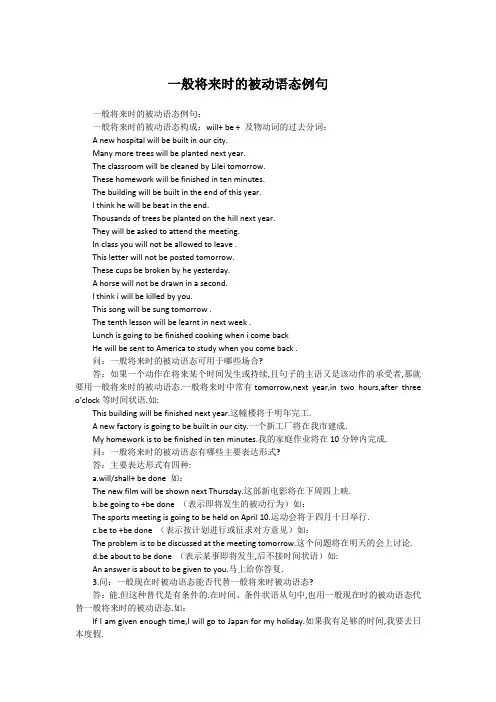
一般将来时的被动语态例句一般将来时的被动语态例句:一般将来时的被动语态构成:will+ be + 及物动词的过去分词:A new hospital will be built in our city.Many more trees will be planted next year.The classroom will be cleaned by Lilei tomorrow.These homework will be finished in ten minutes.The building will be built in the end of this year.I think he will be beat in the end.Thousands of trees be planted on the hill next year.They will be asked to attend the meeting.In class you will not be allowed to leave .This letter will not be posted tomorrow.These cups be broken by he yesterday.A horse will not be drawn in a second.I think i will be killed by you.This song will be sung tomorrow .The tenth lesson will be learnt in next week .Lunch is going to be finished cooking when i come backHe will be sent to America to study when you come back .问:一般将来时的被动语态可用于哪些场合?答:如果一个动作在将来某个时间发生或持续,且句子的主语又是该动作的承受者,那就要用一般将来时的被动语态.一般将来时中常有tomorrow,next year,in two hours,after three o’clock等时间状语.如:This building will be finished next year.这幢楼将于明年完工.A new factory is going to be built in our city.一个新工厂将在我市建成.My homework is to be finished in ten minutes.我的家庭作业将在10分钟内完成.问:一般将来时的被动语态有哪些主要表达形式?答:主要表达形式有四种:a.will/shall+ be done 如:The new film will be shown next Thursday.这部新电影将在下周四上映.b.be going to +be done (表示即将发生的被动行为)如:The sports meeting is going to be held on April 10.运动会将于四月十日举行.c.be to +be done (表示按计划进行或征求对方意见)如:The problem is to be discussed at the meeting tomorrow.这个问题将在明天的会上讨论.d.be about to be done (表示某事即将发生,后不接时间状语)如:An answer is about to be given to you.马上给你答复.3.问:一般现在时被动语态能否代替一般将来时被动语态?答:能.但这种替代是有条件的.在时间、条件状语从句中,也用一般现在时的被动语态代替一般将来时的被动语态.如:If I am given enough time,I will go to Japan for my holiday.如果我有足够的时间,我要去日本度假.。
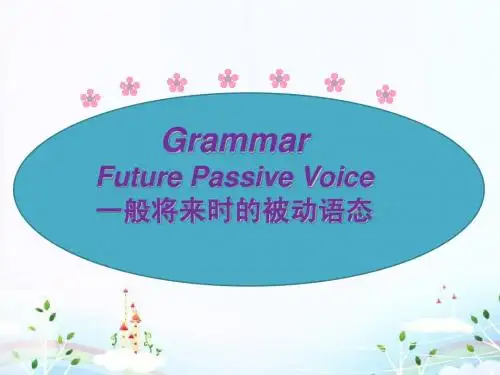
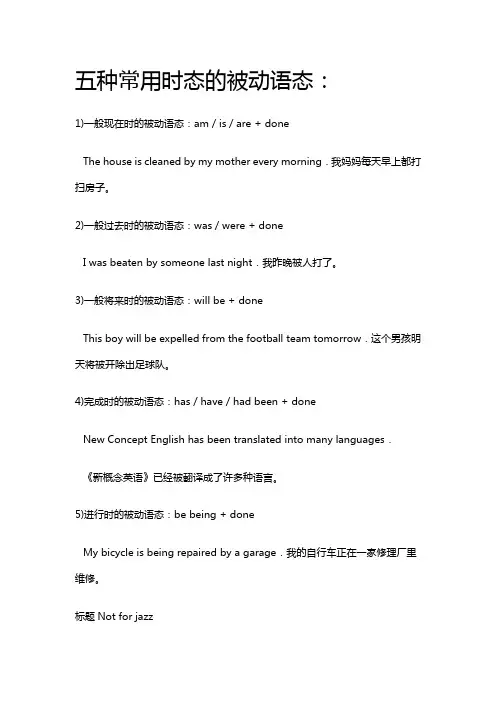
五种常用时态的被动语态:1)一般现在时的被动语态:am/is/are + doneThe house is cleaned by my mother every morning.我妈妈每天早上都打扫房子。
2)一般过去时的被动语态:was/were + doneI was beaten by someone last night.我昨晚被人打了。
3)一般将来时的被动语态:will be + doneThis boy will be expelled from the football team tomorrow.这个男孩明天将被开除出足球队。
4)完成时的被动语态:has/have/had been + doneNew Concept English has been translated into many languages.《新概念英语》已经被翻译成了许多种语言。
5)进行时的被动语态:be being + doneMy bicycle is being repaired by a garage.我的自行车正在一家修理厂里维修。
标题Not for jazz总结for的用法:1)为:I bought a book for you.我为你买了一本书。
2)因为:Something fell in,for I heard a splash.一定有东西掉下去了,因为我听见扑通一声。
4)适合:Not for jazz=It's not suitable to play jazz on the clavichord.古钢琴不适合演奏爵士乐。
Question:What happened to the clavichord?to后面加宾语,表示其身上发生了什么事,即动作的目标、对象。
What happened to you?你怎么了?(在你身上发生了什么事?)(1)否定句与疑问句的被动语态We don’t believe her.我们不信她的话。
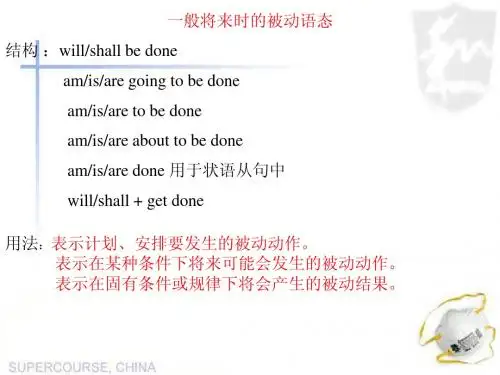
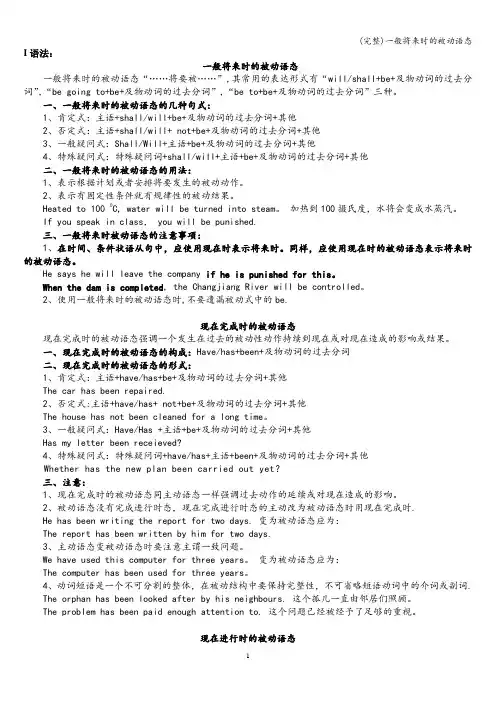
I语法:一般将来时的被动语态一般将来时的被动语态“……将要被……”,其常用的表达形式有“will/shall+be+及物动词的过去分词”,“be going to+be+及物动词的过去分词”,“be to+be+及物动词的过去分词”三种。
一、一般将来时的被动语态的几种句式:1、肯定式:主语+shall/will+be+及物动词的过去分词+其他2、否定式:主语+shall/will+ not+be+及物动词的过去分词+其他3、一般疑问式:Shall/Will+主语+be+及物动词的过去分词+其他4、特殊疑问式:特殊疑问词+shall/will+主语+be+及物动词的过去分词+其他二、一般将来时的被动语态的用法:1、表示根据计划或者安排将要发生的被动动作。
2、表示有固定性条件就有规律性的被动结果。
Heated to 100 0C, water will be turned into steam。
加热到100摄氏度,水将会变成水蒸汽。
If you speak in class, you will be punished.三、一般将来时被动语态的注意事项:1、在时间、条件状语从句中,应使用现在时表示将来时。
同样,应使用现在时的被动语态表示将来时的被动语态。
He says he will leave the company if he is punished for this。
When the dam is completed, the Changjiang River will be controlled。
2、使用一般将来时的被动语态时,不要遗漏被动式中的be.现在完成时的被动语态现在完成时的被动语态强调一个发生在过去的被动性动作持续到现在或对现在造成的影响或结果。
一、现在完成时的被动语态的构成:Have/has+been+及物动词的过去分词二、现在完成时的被动语态的形式:1、肯定式:主语+have/has+be+及物动词的过去分词+其他The car has been repaired.2、否定式:主语+have/has+ not+be+及物动词的过去分词+其他The house has not been cleaned for a long time。
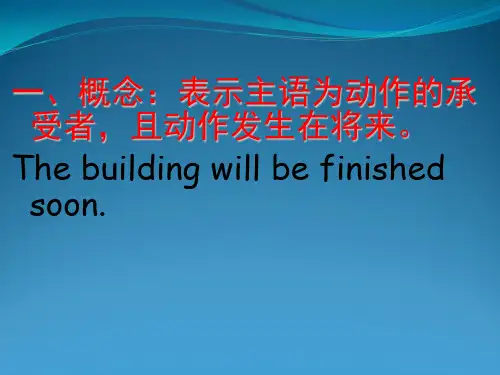
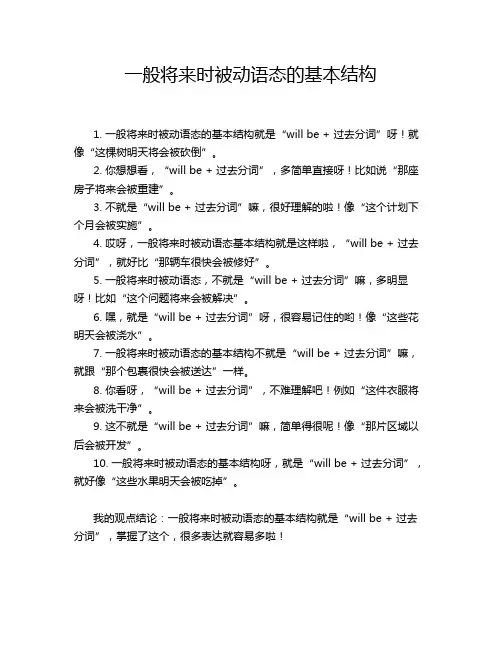
一般将来时被动语态的基本结构
1. 一般将来时被动语态的基本结构就是“will be + 过去分词”呀!就像“这棵树明天将会被砍倒”。
2. 你想想看,“will be + 过去分词”,多简单直接呀!比如说“那座房子将来会被重建”。
3. 不就是“will be + 过去分词”嘛,很好理解的啦!像“这个计划下个月会被实施”。
4. 哎呀,一般将来时被动语态基本结构就是这样啦,“will be + 过去分词”,就好比“那辆车很快会被修好”。
5. 一般将来时被动语态,不就是“will be + 过去分词”嘛,多明显呀!比如“这个问题将来会被解决”。
6. 嘿,就是“will be + 过去分词”呀,很容易记住的哟!像“这些花明天会被浇水”。
7. 一般将来时被动语态的基本结构不就是“will be + 过去分词”嘛,就跟“那个包裹很快会被送达”一样。
8. 你看呀,“will be + 过去分词”,不难理解吧!例如“这件衣服将来会被洗干净”。
9. 这不就是“will be + 过去分词”嘛,简单得很呢!像“那片区域以后会被开发”。
10. 一般将来时被动语态的基本结构呀,就是“will be + 过去分词”,就好像“这些水果明天会被吃掉”。
我的观点结论:一般将来时被动语态的基本结构就是“will be + 过去分词”,掌握了这个,很多表达就容易多啦!。
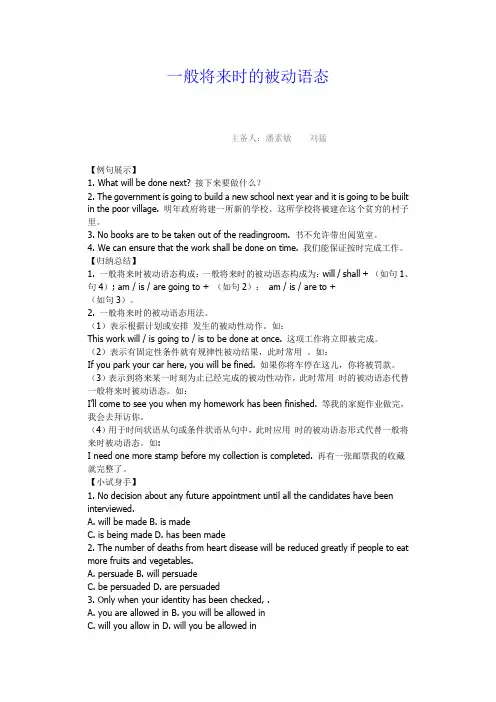
一般将来时的被动语态主备人:潘素敏刘猛【例句展示】1. What will be done next? 接下来要做什么?2. The government is going to build a new school next year and it is going to be built in the poor village. 明年政府将建一所新的学校。
这所学校将被建在这个贫穷的村子里。
3. No books are to be taken out of the readingroom. 书不允许带出阅览室。
4. We can ensure that the work shall be done on time. 我们能保证按时完成工作。
【归纳总结】1. 一般将来时被动语态构成:一般将来时的被动语态构成为:will / shall + (如句1、句4); am / is / are going to + (如句2);am / is / are to +(如句3)。
2. 一般将来时的被动语态用法。
(1)表示根据计划或安排发生的被动性动作。
如:This work will / is going to / is to be done at once. 这项工作将立即被完成。
(2)表示有固定性条件就有规律性被动结果,此时常用。
如:If you park your car here, you will be fined. 如果你将车停在这儿,你将被罚款。
(3)表示到将来某一时刻为止已经完成的被动性动作,此时常用时的被动语态代替一般将来时被动语态。
如:I’ll come to see you when m y homework has been finished. 等我的家庭作业做完,我会去拜访你。
(4)用于时间状语从句或条件状语从句中,此时应用时的被动语态形式代替一般将来时被动语态。
如:I need one more stamp before my collection is completed. 再有一张邮票我的收藏就完整了。
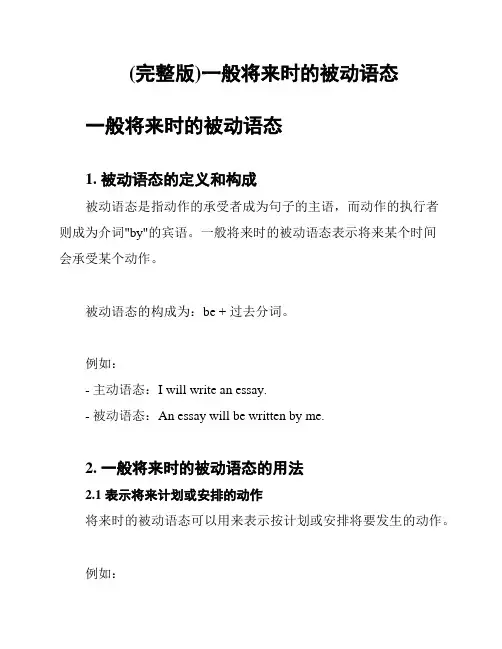
(完整版)一般将来时的被动语态一般将来时的被动语态1. 被动语态的定义和构成被动语态是指动作的承受者成为句子的主语,而动作的执行者则成为介词"by"的宾语。
一般将来时的被动语态表示将来某个时间会承受某个动作。
被动语态的构成为:be + 过去分词。
例如:- 主动语态:I will write an essay.- 被动语态:An essay will be written by me.2. 一般将来时的被动语态的用法2.1 表示将来计划或安排的动作将来时的被动语态可以用来表示按计划或安排将要发生的动作。
例如:- 主动语态:They will hold a ___.- 被动语态:A meeting will be ___.2.2 表示主动语态中的一般将来时的被动语态当主动语态中的谓语动词为一般将来时时,可以转换为一般将来时的被动语态。
例如:- 主动语态:___.- 被动语态:The work will be ___.2.3 阐述将来的预测或推测一般将来时的被动语态也可以用来表达对将来的预测或推测。
例如:- 主动语态:They ___.- 被动语态:A ___.3. 注意事项3.1 动作执行者未知或无关紧要时当我们对动作执行者不感兴趣或无法确定时,可以使用被动语态。
例如:- 主动语态:___ will fix the car.- 被动语态:The car will be fixed.3.2 动作执行者已知但无需强调时当我们知道动作执行者是谁,但无需强调时,可以使用被动语态。
例如:- 主动语态:John will cook the dinner.- 被动语态:The dinner ___.4. 总结一般将来时的被动语态用于表示将来某个时间会承受动作的情况。
它的构成为be + 过去分词,并在一些特定场景下有特殊用法。
在使用一般将来时的被动语态时,需要注意动作执行者未知或无关紧要的情况和动作执行者已知但无需强调的情况。
完整版)各种时态的被动语态1.删除无关段落。
2.改写:各种时态的被动语态由“主语+be+及物动词的过去分词”构成,助动词的形式会随时态、人称和数的变化而变化。
具体结构如下:一般现在时:主语+am/is/are+过去分词一般过去时:主语+was/were+过去分词一般将来时:主语+shall/will+be+过去分词现在进行时:主语+am/is/are+being+过去分词过去进行时:主语+was/were+being+过去分词现在完成时:主语+has/have+been+过去分词过去完成时:主语+had+been+过去分词过去将来时:主语+should/would+be+过去分词含有情态动词的被动语态:主语+情态动词+be+过去分词。
3.改写:这个教室每天都会被打扫。
4.改写:我们的学校是在1998年建造的。
5.改写:运动会将在明天举行。
6.改写:这辆汽车正在被修理。
7.改写:那时候那台机器正在被涂漆。
8.改写:这家银行已经建成了。
9.改写:在我来这里之前,我已经被邀请去日本访问了。
10.改写:XXX告诉我她将会被派往美国。
11.改写:这辆自行车不能放在这里。
I XXX invited so far。
so I'm not sure。
The government in our country will now record tourists' bad r。
It is XXX。
Special passive voice forms:1.When a sense verb (XXX) or a causative verb(make/let/have) is followed by an infinitive without "to" in an active sentence。
the "to" should be added in a passive sentence。
动词的一般将来时被动语态动词的一般将来时被动语态是英语语法中的一个重要概念,它用于描述将来某个时间发生的被动动作或状态。
本文将详细介绍动词的一般将来时被动语态的构成和用法,并提供一些例句供参考。
一、构成动词的一般将来时被动语态由be动词的一般将来时形式和过去分词组成。
be动词的一般将来时的形式为will be,过去分词则根据动词的变化规则进行变化。
例如:The book will be read by her. (她将会被阅读这本书。
)二、用法1. 描述将来发生的被动动作动词的一般将来时被动语态可以用来描述将来某个时间发生的被动动作或状态。
例如:The cake will be eaten by the children tomorrow. (明天蛋糕将被孩子们吃掉。
)2. 表达预测或推测动词的一般将来时被动语态还可以用来表达对将来事件的预测或推测。
例如:The concert will be attended by a large audience. (这场音乐会将会有很多观众参加。
)3. 提议或打算在某些情况下,动词的一般将来时被动语态可以用来表示提议或打算。
例如:The meeting will be held in the conference room. (会议将在会议室举行。
)三、例句1. The letter will be sent by John later. (信将会后来由约翰寄出。
)2. The house will be painted by a professional painter next week. (房子将由一名专业的画家在下周粉刷。
)3. The package will be delivered to your address tomorrow. (包裹将在明天送到你的地址。
)4. The project will be completed by the end of this year. (这个项目将在今年年底完成。
一般将来时的被动语态概念:一般将来时表示将来某个时间要发生的动作或存在的状态,也表示将来经常发生的动作。
二、一般将来时结构:1.主语+ will (shall) + 动词原形~。
动词一般将来时,表示将要发生事(所有人称都可以用will,shall只用于I, We 后面)如:肯定式:They will finish the work next week.否定式:They won’t finish the work next week.疑问式:Will they finish the work next week?2. 主语+ be (am, is, are) going to + 动词原形~。
be going to, 表打算,准备计划将来干;表可能,有必然,通过现象来判断。
如:I’m going to see a film this evening. 今晚上我打算去看电影。
It’s going to rain. 天要下雨了。
We aren’t going to have any lessons next week.我们下周不上课。
注意: will/ shall 和be going to 结构的区别(1)对于事先经过考虑的打算、计划,应使用be going to 结构。
Why are you taking down all the pictures? I am going to repaint the wall.(2)对于事先未经过考虑的打算、计划,而是临时起意,则用will 结构。
常见于会话时,乙听了甲的话做出的反应。
Where is the telephone book? I’ll go and get it for you .(3)表示即将发生某事时,两者区别不大,多可互换。
What is going to happen? -----What will happen?be going to 一般指较近的将来,will则表示较远的将来。
五种常用时态的被动语态:1)一般现在时的被动语态:am/is/are + doneThe house is cleaned by my mother every morning.我妈妈每天早上都打扫房子。
2)一般过去时的被动语态:was/were + doneI was beaten by someone last night.我昨晚被人打了。
3)一般将来时的被动语态:will be + doneThis boy will be expelled from the football team tomorrow.这个男孩明天将被开除出足球队。
4)完成时的被动语态:has/have/had been + doneNew Concept English has been translated into many languages.《新概念英语》已经被翻译成了许多种语言。
5)进行时的被动语态:be being + doneMy bicycle is being repaired by a garage.我的自行车正在一家修理厂里维修。
标题Not for jazz总结for的用法:1)为:I bought a book for you.我为你买了一本书。
2)因为:Something fell in,for I heard a splash.一定有东西掉下去了,因为我听见扑通一声。
4)适合:Not for jazz=It's not suitable to play jazz on the clavichord.古钢琴不适合演奏爵士乐。
Question:What happened to the clavichord?to后面加宾语,表示其身上发生了什么事,即动作的目标、对象。
What happened to you?你怎么了?(在你身上发生了什么事?)(1)否定句与疑问句的被动语态We don’t believe her.我们不信她的话。
一般将来时的被动语态1. 什么是一般将来时的被动语态一般将来时的被动语态是指在将来发生的动作或状态下,主语承受动作或承受状态。
被动语态的结构为:will be + 过去分词。
2. 一般将来时的被动语态的构成一般将来时的被动语态的构成如下:- 肯定句:主语 + will be + 过去分词- 否定句:主语 + will not be + 过去分词- 疑问句:Will + 主语 + be + 过去分词 + ?3. 一般将来时的被动语态的使用情况一般将来时的被动语态通常用于以下情况:- 描述将来的预测、计划或安排- The meeting will be held next week. (会议将于下周举行。
)- The house will be renovated next month. (房子将在下个月进行翻修。
)- 描述某人对将来事件的预测或判断- The movie will be loved by audiences. (这部电影将会受到观众的喜爱。
)- The new product will be well received in the market. (这个新产品将在市场上受到好评。
)- 描述按计划或安排将要发生的动作或事件- The report will be submitted before the deadline. (报告将会在截止日期之前提交。
)- The package will be delivered to your address tomorrow. (包裹将于明天送到您的地址。
)4. 小结一般将来时的被动语态是在将来发生的动作或状态下,主语承受动作或承受状态的语态形式。
它的构成为:will be + 过去分词。
一般将来时的被动语态通常用于描述将来的预测、计划或安排,某人对将来事件的预测或判断,以及按计划或安排将要发生的动作或事件。